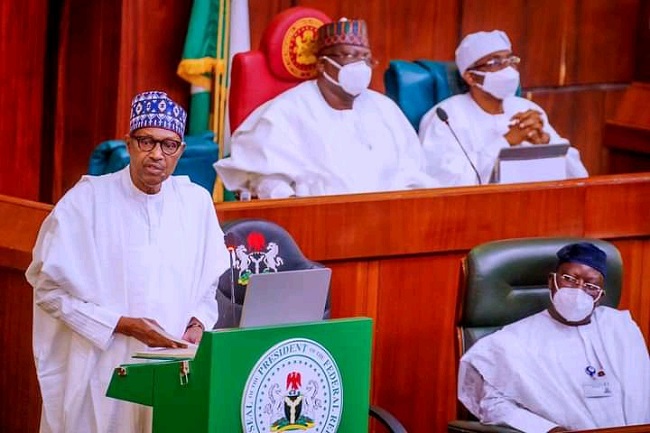President Muhammadu Buhari on Thursday formally laid the N16.39 trillion budget expenditure for 2022 fiscal year tagged: ‘Budget of Economic Growth and Sustainability’ before the joint session of the National Assembly.
The N16.39 trillion budget estimates which was predicated on the key parameters and fiscal assumptions encapsulated in the 2022 – 2024 Medium Term Expenditure Framework and Fiscal Strategy Paper passed by the National Assembly, include total federally-collectible revenue estimated at N17.70 trillion.
These include: conservative oil price benchmark of $57 per barrel; 1.88mbpd oil production (inclusive of Condensates of 300,000 to 400,000 barrels per day); N410.15/$ exchange rate; 4.2 percent projected GDP growth rate and 13 percent inflation rate.
According to him, the total federally distributable revenue was estimated at N12.72 trillion while total revenue available to fund the 2022 federal budget is estimated at N10.13 trillion. This includes Grants and Aid of N63.38 billion, as well as the revenues of 63 Government-Owned Enterprises.
The oil revenue is projected at N3.16 trillion, Non-oil taxes are estimated at N2.13 trillion and FGN Independent revenues are projected to be N1.82 trillion.
The proposed expenditure for 2022 fiscal year comprises N768.28 billion as Statutory Transfers; N6.83 trillion Non-debt Recurrent Costs; N4.11 trillion as Personnel Costs; N577 billion for Pensions, Gratuities and Retirees’ Benefits; N792.39 billion for Overheads; N5.35 trillion for Capital Expenditure including the capital component of Statutory Transfers; N3.61 trillion for Debt Service and N292.71 billion for Sinking Fund to retire certain maturing bonds.
In his address, President Buhari assured that the administration will prioritize defence and internal security, while continuing to ensure that our gallant men and women in the armed forces, police and paramilitary units are properly equipped, remunerated and well-motivated as well as distribute resources fairly and reach vulnerable groups of our society.
On the 2022 fiscal balance, Federal Government projected N6.26 trillion representing 3.39 percent of estimated GDP, slightly above the 3 percent threshold set by the Fiscal Responsibility Act 2007.
According to him, Federal Government planned to “finance the deficit mainly by new borrowings totalling N5.01 trillion, N90.73 billion from Privatization Proceeds and N1.16 trillion drawdowns on loans secured for specific development projects.”
Mr President also unveiled the administration’s plan to review the policy effectiveness of tax waivers and concessions; boost customs revenue through the e-Customs and Single Window initiatives; and safeguard revenues from the oil and gas sector.
While acknowledging that Nigeria has witnessed two economic recessions within the period of this Administration, he argued that the country “had to spend our way out of recession, which necessitated a resort to growing the public debt. It is unlikely that our recovery from each of the two recessions would have grown as fast without the sustained government expenditure funded by debt.”
He assured that the loans will be used to finance critical development projects and programmes aimed at improving our economic environment and ensuring effective delivery of public services to our people, including: completion of major road and rail projects; effective implementation of Power sector projects; provision of potable water; construction of irrigation infrastructure and dams across the country; and critical health projects such as the strengthening of national emergency medical services and ambulance system, procurement of vaccines, polio eradication and upgrading Primary Health Care Centres across the six geopolitical zones.
He also expressed Federal Government’s medium-term plan to grow our Revenue-to-GDP ratio from about 8 percent currently to 15 percent by 2025, adding that at that level of revenues, the Debt-Service-to-Revenue ratio will cease to be worrying.
President Buhari also unveiled plans to further strengthen the frameworks for concessions and public-private partnerships (PPPs). Capital projects that are good candidates for PPP by their nature will be developed for private sector participation, as well as explore available opportunities in the existing ecosystem of green finance including the implementation of our Sovereign Green Bond Programme and leveraging debt-for-climate swap mechanisms.
In the bid to enhance revenue mobilization, President Buhari assured that revenue mobilisation improvement will be sustained in 2022 with the goal of achieving the following objectives, including tax enhancement and excise revenues through policy reforms and tax administration measures; review the policy effectiveness of tax waivers and concessions; boost customs revenue through the e-Customs and Single Window initiatives; and safeguard revenues from the oil and gas sector.
While commending the National Assembly for the passage of the Petroleum Industry Act 2021, he expressed optimism that the implementation of the law will boost confidence in our economy and attract substantial investments in the sector.
Buhari expressed optimism that the recent passage of the Petroleum Industry Act 2021, and consequent incorporation of the Nigeria National Petroleum Corporation (NNPC) should also result in rationalisation of expenditure, as well as increased investments and improved output in the oil and gas industry.
He also announced plans to review the current tax and fiscal laws adding that in line with the administration’s plan, a draft Finance bill, 2022 has been attached with the 2022 budget estimates partly to support the realization of fiscal projections.
Based on the 2021 Fiscal Framework, total revenue of N8.12 trillion was projected to fund aggregate federal expenditure of N14.57 trillion (inclusive of the supplementary budget).
The projected fiscal deficit of N6.45 trillion, or 4.52 percent of GDP, is expected to be financed mainly by domestic and external borrowings.
By July 2021, Nigeria’s daily oil production averaged one 1.70 million barrels (inclusive of condensates) and the market price of Bonny Light crude averaged $68.53 per barrel.
Accordingly, actual revenues were 34 percent below target as of July 2021, mainly due to the underperformance of oil and gas revenue sources. Federal Government’s retained revenues (excluding Government Owned Enterprises) amounted to N2.61 trillion against the proportionate target of N3.95 trillion for the period.
The Federal Government’s share of Oil revenue totalled N570.23 billion as of July 2021, which was 51 percent below target, while non-oil tax revenues totalled N964.13 billion. The poor performance of oil revenue relative to the budget was largely due to the shortfall in production as well as significant cost recovery by NNPC to cover the shortfall between its cost of importing petrol and the pump price.
On the planned deregulation of the downstream sector of the oil industry, he observed that the Petroleum Products Pricing Regulatory Agency (PPPRA) had in March 2020 announced that the price of petrol would henceforth be determined by market forces, the plans was stalled as a result of the rising crude oil prices and exchange rate to push the price above the hitherto regulated price of N145 per litre, as well as opposition against the policy of price deregulation hardened on the part of Labour Unions in particular.
Accordingly, Federal Government had to “suspend further upward price adjustments while engaging Labour on the subject. This petrol subsidy significantly eroded revenues that should have been available to fund the budget.
“On a positive note, we surpassed the non-oil taxes target by 11 percent in aggregate. The sustained improvement in non-oil taxes indicates that some of our revenue reforms are yielding positive results. We expect further improvement in revenue collections later in the year as more corporate entities file their tax returns and we accelerate the implementation of our revenue reforms.”
On the ongoing efforts to improve revenue generation and administration, he disclosed that the administration has stepped up implementation of the strengthened framework for performance management of government-owned enterprises (GOEs), with a view to improve their operational efficiencies, revenue generation and accountability.
According to him, the 50% cost-to-income ratio imposed on the GOEs in the Finance Act 2020 has contributed significantly to rationalizing wasteful expenditures by several GOEs and enhanced the level of operating surpluses to be transferred to the Consolidated Revenue Fund (CRF).
On the expenditure side, as at end of July 2021, total sum of N6.79 trillion had been spent as against the pro-rated expenditure of N7.91 trillion. Accordingly, a deficit of N4.17 trillion was recorded as at end of July 2021. The deficit was financed through domestic borrowing.
According to him, despite our revenue challenges, we have consistently met our debt service commitments, payment of staff salaries, statutory transfers, and overhead costs.
“As at 4th of October 2021, a total of N1.732 trillion had been released for capital expenditure,” adding that the MDAs’ capital budget will be fully by the end of the fiscal year 2021.
“Capital releases thus far have been prioritised in favour of critical ongoing infrastructural projects in the power, roads, rail, agriculture, health and education sectors. We have made progress on the railway projects connecting different parts of the country.”
While noting that Lagos-Ibadan Line has been completed and operational, Mr. President observed that the Abuja-Kaduna Line is running efficiently while the Itakpe-Ajaokuta rail Line was finally completed and commissioned over 30 years after its initiation.
He added that arrangements are underway to complete the Ibadan-Kano Line, while work will soon commence on the Port Harcourt-Maiduguri Line and Calabar-Lagos Coastal Line, which will connect the Southern and Eastern States to themselves and to the North.
On power generation, President Buhari explained that progress is also being made on several power generation, transmission, and distribution projects, as well as off-grid solutions, all aimed towards achieving the national goal of optimizing power supply by 2025.
On the achievements made on road projects, President Buhari expressed optimism that strategic road construction projects including: Lagos-Ibadan expressway, Apapa-Oworonsoki expressway, Abuja-Kano expressway, East-West Road and the Second Niger Bridge will be commissioned before the end of his tenure in 2023.
On the public service reform, he assured that his administration will “continue to push our expenditure rationalization initiatives which we commenced in 2016. For example, on personnel costs, the number of MDAs captured on the Integrated Payroll and Personnel Information System increased from 459 in 2017 to 711 to date.”
YOU SHOULD NOT MISS THESE HEADLINES FROM NIGERIAN TRIBUNE
Buhari Urges MTN For Quality Service, Downward Price Review In Cost Of Data, Other Services
President Muhammadu Buhari Friday at State House Abuja urged the MTN Group to make the available top-of-the-range service to its Nigerian subscribers… Buhari presents N17.39trn Appropriation bill Buhari presents N17.39trn Appropriation bill Buhari presents N17.39trn Appropriation bill Buhari presents N17.39trn Appropriation bill.
WATCH TOP VIDEOS FROM NIGERIAN TRIBUNE TV
- Let’s Talk About SELF-AWARENESS
- Is Your Confidence Mistaken for Pride? Let’s talk about it
- Is Etiquette About Perfection…Or Just Not Being Rude?
- Top Psychologist Reveal 3 Signs You’re Struggling With Imposter Syndrome
- Do You Pick Up Work-Related Calls at Midnight or Never? Let’s Talk About Boundaries







